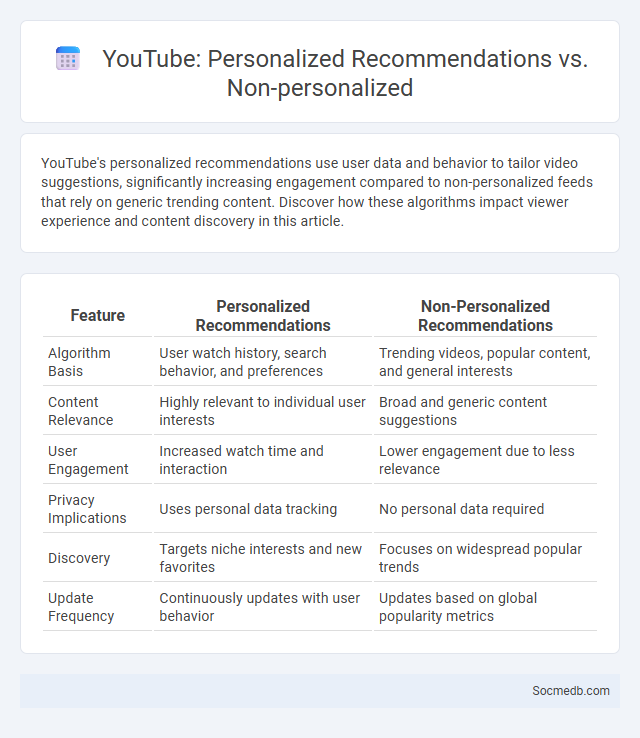
Photo illustration: YouTube Personalized Recommendations vs Non-personalized
YouTube's personalized recommendations use user data and behavior to tailor video suggestions, significantly increasing engagement compared to non-personalized feeds that rely on generic trending content. Discover how these algorithms impact viewer experience and content discovery in this article.
Table of Comparison
| Feature | Personalized Recommendations | Non-Personalized Recommendations |
|---|---|---|
| Algorithm Basis | User watch history, search behavior, and preferences | Trending videos, popular content, and general interests |
| Content Relevance | Highly relevant to individual user interests | Broad and generic content suggestions |
| User Engagement | Increased watch time and interaction | Lower engagement due to less relevance |
| Privacy Implications | Uses personal data tracking | No personal data required |
| Discovery | Targets niche interests and new favorites | Focuses on widespread popular trends |
| Update Frequency | Continuously updates with user behavior | Updates based on global popularity metrics |
Introduction to YouTube Recommendation Systems
YouTube recommendation systems utilize advanced machine learning algorithms to personalize video suggestions based on your viewing history, preferences, and engagement patterns. These systems analyze vast amounts of data including watch time, likes, shares, and comments to optimize content delivery for maximum relevance and user retention. By continuously refining recommendations, YouTube enhances your experience, helping you discover new and relevant videos tailored specifically to your interests.
What Are Personalized YouTube Recommendations?
Personalized YouTube recommendations are algorithm-driven suggestions tailored to individual users based on their viewing history, search queries, and engagement patterns. These recommendations utilize machine learning models analyzing factors like watch time, video likes, and channel subscriptions to curate relevant content. By continuously adapting to user preferences, personalized recommendations enhance user experience and increase video discovery on the platform.
Understanding Non-personalized YouTube Recommendations
Non-personalized YouTube recommendations rely on trending videos, popular content categories, and global user engagement metrics rather than individual viewing history. These algorithms analyze broad popularity signals like video view counts, likes, and shares to suggest content to users without tailored preferences. Understanding this helps marketers optimize video titles, tags, and descriptions to capture wider audience attention beyond personalized feeds.
How YouTube Algorithm Delivers Personalized Content
YouTube's algorithm uses machine learning to analyze your watch history, search queries, and engagement patterns to deliver highly personalized content tailored to your preferences. It prioritizes videos with higher user interaction and relevance, constantly updating recommendations to adapt to your evolving interests. This dynamic system ensures your feed is curated to enhance viewer satisfaction and keep you engaged longer.
Key Differences: Personalized vs Non-personalized Recommendations
Personalized recommendations on social media use algorithms to analyze Your behavior, preferences, and interactions, delivering content tailored specifically to Your interests. Non-personalized recommendations present general content based on popularity or trending topics without considering individual user data. This distinction significantly impacts user engagement, content relevance, and the overall social media experience.
Advantages of YouTube Personalized Recommendations
YouTube's personalized recommendations enhance your viewing experience by delivering customized video suggestions based on your watch history, preferences, and engagement patterns. This targeted approach helps you discover relevant and diverse content effortlessly, saving time and increasing satisfaction. Leveraging advanced algorithms, YouTube continuously refines these recommendations to match evolving interests, improving content relevance and user retention.
Limitations and Issues with Personalized Recommendations
Personalized recommendations on social media often face limitations like filter bubbles and privacy concerns that restrict your exposure to diverse content and compromise data security. Algorithmic biases can reinforce existing prejudices by promoting certain viewpoints while suppressing others, affecting user experience and content fairness. These issues highlight the need for transparency and improved data handling to ensure recommendations truly cater to your preferences without negative consequences.
Impact of Non-personalized Recommendations on User Experience
Non-personalized recommendations on social media often lead to irrelevant content that diminishes user engagement and satisfaction. Your experience may be hindered by a lack of tailored suggestions, resulting in reduced time spent on the platform and decreased interaction. Platforms leveraging personalized algorithms typically provide more meaningful and engaging content, enhancing overall user experience.
Privacy Concerns in YouTube Content Recommendations
YouTube content recommendations often rely on extensive data collection, raising significant privacy concerns regarding user tracking and profiling. Your viewing habits, search history, and engagement patterns are analyzed to personalize suggestions, potentially exposing sensitive information without explicit consent. Ensuring transparent data use policies and enhancing user control over sharing preferences are critical steps to address privacy risks in YouTube's recommendation algorithms.
The Future of YouTube's Recommendation Algorithms
YouTube's recommendation algorithms are evolving to enhance personalized content delivery by leveraging advanced machine learning and user behavior analytics. These algorithms aim to increase viewer engagement by accurately predicting your interests and surfacing videos tailored to your preferences. Continuous improvements focus on reducing misinformation and promoting diverse, high-quality content to create a safer and more enriching user experience.
 socmedb.com
socmedb.com